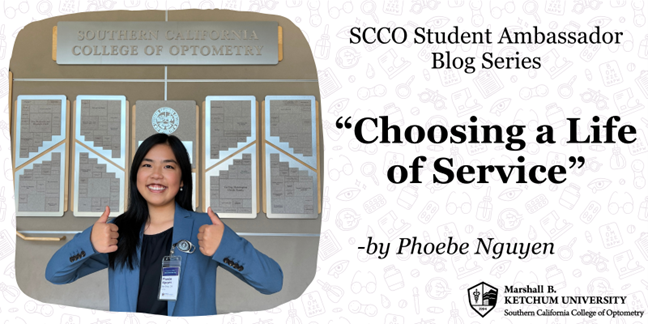Choosing a major was daunting. How could I choose a career path at 17 years old when I did not even know myself yet? You might be at that same point – what career path should I pursue?
I chose to study biochemistry at UCLA, leading to people commonly asking me, “Are you pre-med?” I never gave a definite answer because I have always been interested in healthcare, which is why I chose a science major, but did not know if medicine was my path.
Fortunately, I was able to grow my passion for community service through volunteering with Vietnamese Community Health (VCH) at UCLA. This student-led organization combats health inequity by providing free health services to predominantly Hispanic and Vietnamese underserved communities in Orange County. This organization allowed me to serve the community while exploring different health fields through the various professionals invited to these events. I worked alongside nursing students administering glucose and cholesterol screenings, dental students providing cleanings, pharmacy students doing medicine consultations, and medical doctors consulting on varying specialties. Questions I asked myself during these interactions included: Could I see myself doing these same tasks every day? Am I willing to sacrifice some aspects of my life to pursue that path, such as family time and free time? How much flexibility do I want regarding my work and life balance? Does income matter to me? What do I want to achieve in this lifetime? What am I passionate about?
During a health fair, I assisted SCCO students from Student Volunteer Optometric Services to Humanity (SVOSH) who performed vision screenings. In Vietnamese, I asked patients various questions on behalf of the optometry students, such as if they were experiencing blurry vision or to look forward while the optometry students used their ophthalmoscopes. I was also able to help patients pick out free frames donated to VCH to distribute at the health fair (as pictured). Unlike when I worked with other health professionals at VCH events, I felt an unexpected connection to optometry, a spark I thought was worth exploring. Expressing this interest, an SCCO student from SVOSH encouraged me to check out if my school had any pre-optometry groups.
My understanding of the optometry field furthered as I joined UCLA’s Pre-Optometry Society halfway through my second year of undergraduate school. I was engrossed by how passionately other students spoke about optometry. Since then, my desire to become an optometrist was reaffirmed through my experience within different optometry offices. I constantly felt empowered to do my best, embraced changes and challenges, and strengthened my relationships with the doctors, opticians, and patients. I felt more connected with optometry as I became more informed of how visual impairments affected people’s lives tremendously. I explored all my options and felt optometry fits my personality and interests the best. Similarly, I encourage those still considering optometry, or any career path, to get involved in their campus community or network with people within their careers of interest, while pondering the same questions I asked myself.
Along my journey, VCH showed me how evident health disparities were within the underserved communities, who oftentimes had limited to no English proficiency, lower socioeconomic status, and no health insurance. From the start of my time with VCH, I wanted to discover new ways to bridge the gaps seen in healthcare and played a larger role within the organization later in my undergraduate career as the Health Fair Coordinator, alongside Michelle Le (funny enough another Student Ambassador attending SCCO!). This passion led me to my passion for optometry. Many people live and perceive the world based on visual information and playing a role in protecting their visual health motivates me to pursue optometry. I saw how vision was more than just the eyes. The visual system impacts your ability to focus, drive, walk with balance, and study.
What happens when people do not have the means to receive a comprehensive eye exam? After my time at SCCO, I hope to implement resources for more accessible vision care for low income communities wherever I end up working and continuing to volunteer at community service events as an optometrist. You are more than welcome to contact me (phoebenguyen.scco27@ketchum.edu) if you have any questions about my journey and want to discuss more in-depth about my reasonings for choosing optometry or my commitment to giving back to my community.
Click here to read Student Ambassador bios on our website!

